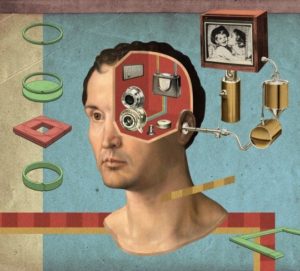 Have you heard of the World Happiness Report? It sounds like a children’s book, or a fantasy movie: too charming and healthy to be a real thing.
Have you heard of the World Happiness Report? It sounds like a children’s book, or a fantasy movie: too charming and healthy to be a real thing.
But it is. It’s an annual document compiled by the U.N. (1) The most recent one came out last month on the Vernal Equinox, the first day of the zodiacal year.
From this date, astrologers infer key lessons about the cycle now underway.
Not by bread alone
The Happiness Report’s most striking conclusion is this: Social factors, not purely economic ones, are what lead to satisfying lives. Did I hear you say “Duh”?
These findings are unsurprising to those of us who see the human psyche as an amalgam of mind, body and spirit. For holistic thinkers it is axiomatic  that “man cannot live by bread alone.”
that “man cannot live by bread alone.”
Now, a group of dry-eyed international statisticians have made it official. “Good social foundations and trust,” they say, are what make for a highly functioning society.
Curbing greed
What makes this idea newsworthy is that it flies in the face of the definition of success in the capitalist world.
In modern secular societies, monetary gain — for its own sake — is the great unspoken goal. It has replaced all those fuzzy  aspirations that propelled our forebears: loyalty to tribe and clan, being “a good Christian,” the ideals of the romantic era, the earnest self-improvements of the Victorians.
aspirations that propelled our forebears: loyalty to tribe and clan, being “a good Christian,” the ideals of the romantic era, the earnest self-improvements of the Victorians.
Even the gentlemanly notion of noblesse oblige — whereby, if you were to the manor born, you were honor-bound to help your underlings — has faded into the sepia sunset with Downton Abbey.
This is not to say that the past was ethically superior to the present. Most everywhere we look in recorded history, cultural morality is belied by rank hypocrisy. Whatever their belief systems, our ancestors certainly seemed woefully incapable of filling the bellies of the poor.
But these bygone codes of honor did offer, at least, a theoretical curb on greed. In our post-moral era, those curbs are all but gone.
Cardinal T-square
On an individual level (our focus in the Skywatches), we are born life-affirming and instinctively moral. But in groups, our efforts to create humane societies are painfully flawed. Collective consciousness growth is slow.
And yet, participating in this mass movement towards consciousness is part of our work as individuals. And self-awareness is the only way we can change the world.
2017 is important in this regard, as the cardinal T-square overhead provokes a growth spurt for many people the world over.
The American Dream
It was England’s Industrial Revolution that inaugurated the new age of insatiable rapacity. But it is Uncle Sam who took  it to a never-before-dreamed-of extreme. Consider the self-congratulatory phrase “the American Dream:” a bottom-line agenda disguised as some sort of idealistic quest.
it to a never-before-dreamed-of extreme. Consider the self-congratulatory phrase “the American Dream:” a bottom-line agenda disguised as some sort of idealistic quest.
“The American Dream” has become a litany, the call to prayer of our national religion: an incantation that inspires people all over the world. But its subtext is far less exalted. In common parlance, the phrase usually means buying a house.
“The American Dream” is a cultural euphemism. Despite being wrapped in the gauze of noble yearning, its real meaning is understood by one and all: that if someone is ambitious enough, America will give them a green light to get obscenely rich.
Euphemism
Euphemisms are fascinating things, offering up a window into the sordid underworld of the psyche. By definition, they arise out of ambivalence.
They are usually left deliberately undefined by those who invoke them, and it is easy to see why. In the case of “The American Dream,” no one wants to sound like they’re celebrating something so crass as the hunger for mammon.
Politicians who champion “the American Dream” are appealing to a selfish drive as old as dirt, but recasting it as a new (historically speaking) and heroic patriotic myth.
The allusion is to a magic something-in-the-water that exists only in this country, whereby the humblest of seekers has a carte blanche into the good life.
Hamilton
“ ‘Everyone shall sit under their own vine and fig tree, And no one shall make them afraid.’ ”- George Washington, Hamilton
Not for nothing is it called a Dream. It’s a dream of a uniquely welcoming nation, offering all comers a degree of self-fulfillment improbable anywhere else. The image is exquisitely humane, and many hold it to be the core truth at the nation’s beating heart.
This may help us explain the near- hysterical rapture with which Americans are reacting to the musical Hamilton. It’s as if audiences are hoping against hope that this ingenious piece of art will render true everything they learned about their country in second grade but which has been disproven ever since.
hysterical rapture with which Americans are reacting to the musical Hamilton. It’s as if audiences are hoping against hope that this ingenious piece of art will render true everything they learned about their country in second grade but which has been disproven ever since.
Fourteenth on the scale
For all its land-of-opportunity press, the USA comes up only 14th on the U.N. Happiness Index. In average life expectancy it ranks 42nd in the world. It has the fifth worst infant mortality rate out of 34 OECD countries.
But it is only over the past couple of months that the contradiction between America’s dream and its reality has been so garishly obvious. Two recent projects as stupid as they are cruel, the Mexican wall and the Muslim travel ban, have turned on its head the idea of the USA as a welcoming country.
As for the rags-to-riches myth, it is increasingly the case that if you were born poor in this country, you’ll very probably stay that way. Of the twenty “most advanced democracies,” the USA has the greatest inequality and the lowest social mobility.
The trend is even more obvious in the demographics of our cities. Thirty years ago, most American towns contained a broad economic spectrum of residents. Now, whole cities are mostly rich (San Francisco, Seattle) or mostly poor (Detroit, Baltimore).

Addictive cult
On our watch, soulless materialism seems to have reached a zenith, as personified by the vicious huckster now in the White House.
Bragging that his tax evasions make him “smart,” exaggerating his wealth to impress his listeners, the man campaigned as an unapologetic money-maker.
Remarkably, the only problem much of the public had with this scenario was deciding whether he really was the financial wizard he claimed to be — not whether wealth accumulation were, in itself, a suitable criterion for the presidency.
This appalling fact exposes a problem that goes deeper than the character flaws of one repulsive individual. America’s obsession with money is a societal malady. Instead of fixating on Trump, we ought to be considering what he represents.
The astrology of the situation suggests that now would be a good time to look at how the quest for wealth became a national addiction.(2)
Insatiable
We tend to think of materialists as people who disdain the superstitions of religion. But money mania is as steeped in irrationality as any other cult.
 Have you ever wondered why people who are already ludicrously rich feel compelled to make ever more millions and billions? Not just enough wealth to be comfortable, nor even to be very, very comfortable. The point seems to be to acquire increasingly greater wealth, however much they have.
Have you ever wondered why people who are already ludicrously rich feel compelled to make ever more millions and billions? Not just enough wealth to be comfortable, nor even to be very, very comfortable. The point seems to be to acquire increasingly greater wealth, however much they have.
This is a desire not for achievement, but for something unquenchable: never-ceasing accumulation. It savors of compulsion.
Venal instincts
Like other venal instincts, narcissism and avarice have been justified in pseudo-scientific terms by their practitioners. They are character flaws that our society has tried to intellectually rehabilitate, to justify our obsession with wealth.
The effort to ideologically vindicate selfishness is all the rage in Washington these days. High-profile fans of the nutty fantasist Ayn Rand (Milton Friedman, Paul Ryan et al) really seem to believe that the vices glamorized in her books represent sober, practical social policy.
The garbled social Darwinism of these Washington insiders, garbled even further by the idiots-on-a-couch at Fox News, had a lot to do with the stunningly counter-intuitive coalition that coalesced between the one-per-centers and the abandoned white underclass (see blogs from early and late January, February and March.)
Era dying
But the impulse towards societal selfishness has a bigger scope than the current mess in Washington. It is part and parcel of the era now dying: an era based on an economic model that has de-coupled growth from moral or practical constraints.
As an ethical philosophy, it seems crazily disconnected to imagine that business growth is an unqualified good,  above and beyond its human cost. But the profit ethic that dictates received wisdom in the modern world does indeed see things this way, and trains us, the consumers, to see things this way.
above and beyond its human cost. But the profit ethic that dictates received wisdom in the modern world does indeed see things this way, and trains us, the consumers, to see things this way.
Take the ritual of shopping, in which we prioritize quantity over quality. It was the Baby Boomer generation that saw the rise of big-box discount stores, which, though their products may be disposable crap, and derive from the exploitation of human beings far away, they’re deemed acceptable because prices are low and availability high.
Boundless
The most recent exponents of growth-at-any-cost, the tech titans, follow the same playbook as their grandfathers, but disguise it in a flashy new cover.
Consider Salesforce’s Marc Benioff, widely touted as a visionary, who boasted the other day about a “boundary-less technology revolution offering boundless possibilities.” Boundless? Really? Wouldn’t a more realistic vision be about the inescapable boundaries inherent in living on a finite planet?
 Ecological thinking has awakened more and more of us to the folly of unlimited growth. We now know that this model is threatening the survival of Earth’s atmosphere, oceans and entire food web.
Ecological thinking has awakened more and more of us to the folly of unlimited growth. We now know that this model is threatening the survival of Earth’s atmosphere, oceans and entire food web.
Moreover, limiting environmental toxicity is not enough. The more-is-better mindset has also kept us blind to the fact that the human race is breeding itself into peril, having eradicated almost a third of the arable land since 1960.
In a few years, overpopulation will be on everybody’s minds. We are about to break through our mass denial about the implications of living on a planet whose 7½ billion people are increasing their numbers by 223,000 per day.
In extremis
Extremes are unsustainable. This is either the good news or the bad news, depending on how you look at it.
Astrology presents this idea through the symbolism of Pluto, which governs the process by which decay turns into renewal (and then to decay, and then to renewal again… and so on ad infinitum.) This is the reasoning behind Pluto’s rulership of death.
Organic organisms aren’t the only things that decay. Character traits and habit patterns and empires decay. And while they’re decaying, they express themselves in extremis.
As anyone who’s gone through a Pluto transit knows, if a pattern grows so extreme that it cannot go any further along a given trajectory, it self-destructs.
Fever pitch
If we didn’t factor in Plutonian logic, we would see grotesque exaggerations as merely perverse. But when we do factor it in, we can understand why, right now, absurdly immoderate partisanships and self-destructive behaviors are at a fever pitch in our world.
The pressures upon the Earth right now are far too complex to be addressed by a Happiness Report. But the fact that it exists is illuminating. It can inspire us to reconsider values with which we have been conditioned from infancy — values that set the bar for human fulfillment way too low.
Notes
1) The little Himalayan country of Bhutan thought up the idea of a world happiness report, in 2011. They have officially adopted Gross National Happiness instead of Gross Domestic Product as a development indicator.
2) The signature for this can be found in the Sibly chart of the USA; e.g. Pluto [power] in the 2nd house [material security], Jupiter/ Venus [gain/ finances] conjunct the Sun (see Soul-Sick Nation). The transits to this chart – e.g. Pluto returning, while opposing Mercury – help us understand Uncle Sam’s current fragmentation (see At the Crossroads).

